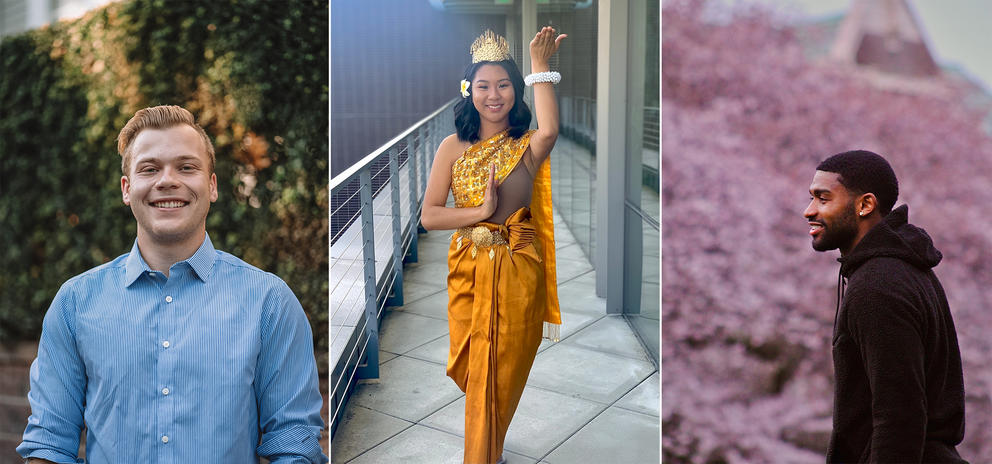The University of Washington advertised a “historic interactive Commencement celebration” and promised it would be “a unique Grad Experience, custom created with cutting-edge technology and virtual magic.”
Terrell Bynum, who is graduating with a communications degree with the business sales certificate, believes “graduation is meant to bring everyone together, and [a virtual graduation] is not that anymore.”
After everyone 16 and older became eligible for the vaccine in April, the Class of 2021 started to hope for an opportunity to graduate in person. Although 2020’s in-person commencement was canceled due to the pandemic, vaccinations and the CDC’s updated guidelines have made it safer to host large gatherings.
After years of hard work, many students looked forward to the day that they can celebrate their achievements with their family and peers, as well as finally walking in their caps and gowns to receive the diploma they worked so hard to attain.
On April 1, UW President Ana Mari Cauce announced in an email that commencement would be held virtually on June 12, through an online format similar to last year. This news was disheartening to students, especially after hearing that other schools in relatively close proximity such as Boise State University and UC Berkeley were holding in-person graduation ceremonies this spring.
While the average student may be missing out on an exciting experience in their lives, to many first-generation graduates and their families, this event may be important and personal for the whole extended family.
For Bynum’s family, graduation means more than walking across a stage.
“My mom wants the whole family to come together. A graduation can be more for the people who supported you than it is for the actual person,” Bynum said. “I do not think that a virtual experience can be personal.”
Although graduating “almost feels like a standard now,” Bynum shares that [his] “parents, on the other hand, are very proud to have raised three kids to go to college, when they themselves did not have the opportunity to.”
As some graduates expressed their disappointment about a virtual graduation, others expressed ways in which their experience could feel more specialized. Julie Lim, who is a first generation Cambodian college graduate, earned a degree in American Ethnic Studies, said the university could add videos or clips so that students of color “can speak and share their voices, instead of the basic five people pop up on a screen for a few seconds.”
Taylor Freitag, who earned a bachelor’s degree in business administration, suggested the “overwhelming majority” of students would have been willing to attend “at least a partially in-person graduation ceremony,” suggesting “college-specific” ceremonies for smaller, more personal gatherings.
Lim explained that being a first-generation graduate is one of the biggest parts of her identity and that it has taught her resilience. During her time at UW, she joined the Khmer Student Association, which is an association of Southeast Asian students who share, promote, and encourage Khmer culture. Her opportunities as a college student led her to special moments, such as the 2019 Khmer New Years Show. Lim believes that her experiences as a first-generation college student and graduate have contributed to the person she is today.
“Being a first-generation college graduate is being a first-generation everything.” Lim said. She continues to share that first-generations are usually the “first to earn credit in the family, first to own their own car, to buy their own home, first to even take official courses with large lectures and audiences.”
“If the school can host football games, then they can host graduation,” Lim said. “Since this is not the case, I think it shows that they do not care as much about their students as much as they say they do, especially as students of color are typically first-generation students.”
The university has announced the football team would allow a limited number of fans to attend spring practices, which disappointed students who had hoped for a limited capacity graduation ceremony.
Although proud of all of her opportunities and accomplishments, Lim said she is “going to miss that feeling of walking across the stage and feeling accomplished and wearing a cap and gown while being around other graduates.”
Freitag called the decision to hold a virtual graduation “short-sighted” and “ill-timed.” He described graduation as “an extremely important and impactful moment” for any college graduate, especially those who are first-generation. He felt excluded by UW’s decision-making process, and feels they didn’t really consider other paths that they could have given first-generation graduates “that special moment.”
Taylor also believes the university should have included students in their decisions about graduation and considered how it would affect first-generation students, adding that UW “failed [them] in every meaningful way.”
This story was written for a University of Washington journalism class.



